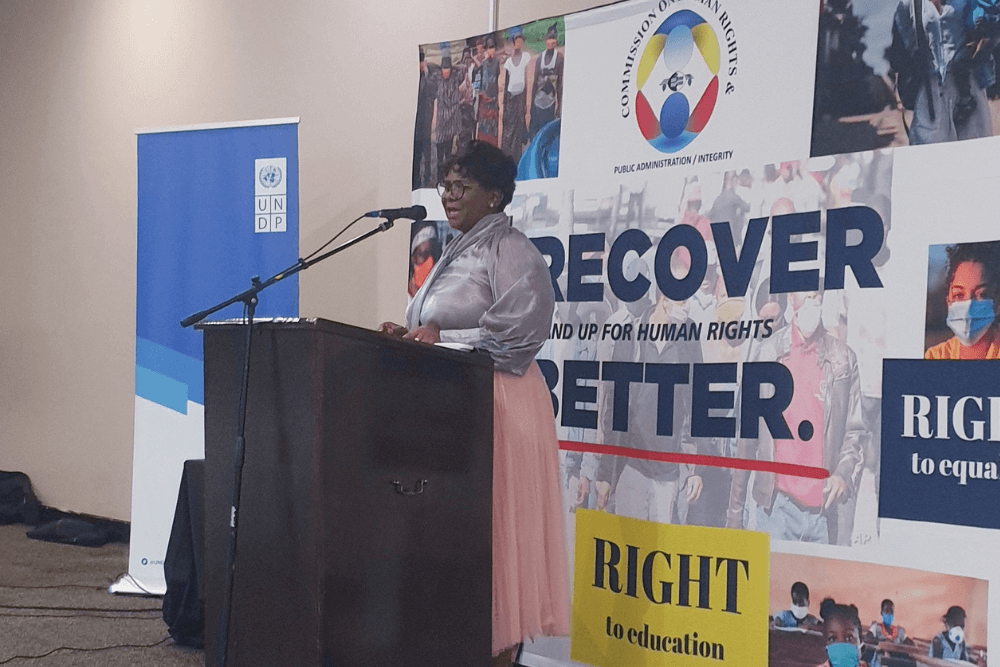Persons with disabilities in Eswatini often face discrimination and other barriers that inhibit their full and equal participation in the justice system. As magistrates courts are often the first port of call for those interacting with the justice system in Eswatini, magistrates are critical actors in ensuring that persons with disabilities are provided with the procedural and other accommodations necessary to fully engage in court proceedings.
In this connection, the ICJ co-facilitated a hybrid online and in-person workshop, organized together with the Eswatini Commission on Human Rights & Public Administration (CHRPA) and the United Nations Development Programme, which Judge Majahenkhaba Dlamini formally opened on behalf of Chief Justice Bheki Maphalala.
According to a 2017 census, persons with disabilities constitute 13.4 percent of the Eswatini population. In this context, Deputy Commissioner at the Eswatini CHRPA, Duduzile Dlamini-Nhlengethwa described persons with disabilities as the “largest minority in the world, and noted that having acceded to the Convention on the Rights of Persons with Disabilities (CRPD), Eswatini is “currently preparing its report to the CRPD Committee”. In this context, the Deputy Commissioner therefore explained the importance of “enhanc[ing] the capacity of State actors in the protection of human rights” and, in particular “ensur[ing] Magistrates are able to utilize a disability-rights lens when dealing with matters involving persons with disabilities.”
After engagements with regional experts from Malawi, Lesotho, Ghana, Kenya and South Africa, the magistrates in attendance shared their experiences in interacting with persons with disabilities in their courtrooms. They thereafter discussed innovative ways to better accommodate persons with disabilities and thereby give effect to Eswatini’s obligations in court proceedings, amid resource constraints, heavy caseloads and other challenges.
Wilson Macharia, an Associate Legal Adviser at the ICJ, who facilitated two sessions at the workshop said:
“It is positive to note the willingness of the magistrates to use appropriate terminology when referring to and interacting with persons with disabilities. We are also encouraged by their desire to strive to ensure improved capacity to provide procedural and other appropriate accommodations. We hope that they will make good on these aspirations and contribute to in eliminating the physical, institutional, legal and attitudinal obstacles that prevent persons with disabilities in Eswatini from engaging in court proceedings on an equal basis as complainants, witnesses, accused persons, legal and judicial officers or experts.”
The ICJ looks forward to further collaboration with CHPRA, organizations of persons with disabilities, the judiciary, and other partners to ensure Eswatini’s compliance with its obligations in terms of the CRPD, including the obligation to ensure effective access to justice for all people on an equal basis.
CHRPA Deputy Commissioner Duduzile Dlamini-Nhlengethwa’s opening remarks are available here.
Contact
Mulesa Lumina, ICJ Africa Communications and Legal Officer, e: Mulesa.Lumina@icj.org.
Wilson Macharia, ICJ Africa Associate Legal Adviser, e: wilson.macharia@icj.org
Timothy Fish Hodgson, ICJ Legal Adviser on Economic, Social and Cultural Rights, e: timothy.hodgson@icj.org.
Background
The workshop, which took place online and in-person in Ezulwini, Eswatini between 27 and 29 October 2022, brought together magistrates from across Eswatini, as well as advocates for the rights of persons with disabilities, judicial officers and disability rights experts from Kenya, Malawi, Ghana and Lesotho.
As a State Party to the Convention on the Rights of Persons with Disabilities (CRPD) Eswatini is bound to realize the rights of persons with disabilities. This includes ensuring equal access to justice for all persons with disabilities by providing the necessary substantive, procedural, and age- and gender-appropriate accommodations and support, as outlined under Articles 12 and 13 of the CRPD.
Eswatini’s obligations as regards access to justice for persons with disabilities are further articulated in the General Comments of the UN Committee on the Rights of Persons with Disabilities (see, for example, General Comment No. 7), and in frameworks such as the International Principles and Guidelines on Access to Justice for Persons with Disabilities, published by the UN Special Rapporteur on the Rights of Persons with Disabilities, and formally endorsed by the ICJ after the organization participated in the drafting process.





